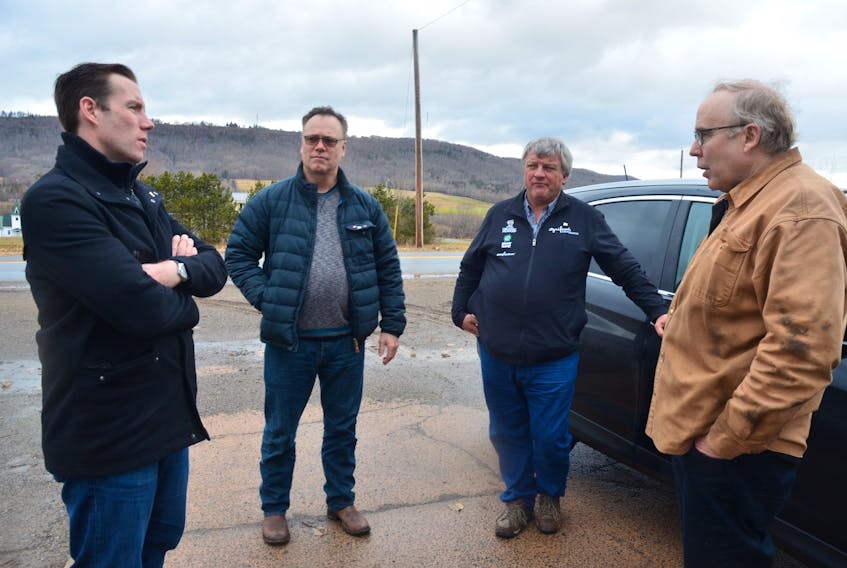PEREAU, NS - Discussing potential impacts of proposed federal tax changes on agriculture and formulating policy were top of mind as an associate Conservative shadow minister visited the Annapolis Valley.
Foothills, Alberta, MP John Barlow made stops in Annapolis County on Jan. 12 and in Kings on Jan. 13. Barlow is the Conservative’s associate shadow minister for Agriculture and Agri-food. One of his stops on Jan. 13 was Melvin Farms Ltd. in Pereau, a fifth-generation family farm specializing in vegetable production, particularly cauliflower and spinach.
President and co-owner Richard Melvin said he doesn’t wave any political flag but he applauds Barlow’s initiative to reach out and try to get a handle on agricultural issues in Nova Scotia and across Canada. Melvin said we need more of that from our elected officials.
Impact of federal tax changes
Melvin said as far as he can tell, there aren’t any “detrimental elements” to the proposed federal tax changes that would concern them in terms of transitioning farm assets or capital gains.
However, when you’re talking about taxation, “the devil is in the details.” There probably are legitimate concerns from an agricultural perspective. Tax policy covers a wide swath of small to large businesses and different corporate structures.
Melvin said the actual legislative and regulatory changes are yet to come and a lot of concerns from the agricultural sector could have to do with fear of the unknown. It’s natural and instinctual to react to undefined possibilities that could impact a business’s bottom line.
“There are the intended consequences and the unintended consequences and it’s always the unintended ones that concern people and they are hard to predict when you make changes into a complex framework like taxation,” Melvin said.
He said he believes that the federal government is trying to make the tax system reflective of today’s needs, so he gives them credit for that and for listening to farm groups at hearings across the country. Hopefully agrarians will be able to give the federal government credit after farmers “see the fine print” and whether or not a reasonable job has been done negotiating all the complex areas.
Level the playing field
Melvin said one “bread and butter issue” pertaining to horticulture that they run into on a national scale are federal-provincial business risk management programs. Some provinces, such as Quebec, do “provincial top loading”, enriching the programs and providing a stronger safety net.
“It reflects in putting us at a bit of a competitive disadvantage, so it’s been a long, ongoing challenge,” Melvin said.
He isn’t against farmers in provinces such as Quebec getting enriched programs with all the elements of risk in production but he wishes the federal government would help facilitate a more level playing field across the country.
National food strategy
Melvin is encouraged with work toward a national food strategy being carried out by the federal government and its agencies. He said about 13 per cent of the population in Nova Scotia doesn’t have access to reasonable amounts of healthy food. A lot of these people are low-income families with children. A lack of healthy eating leads to increased healthcare costs to the public treasury.
Melvin said he believes an investment in making healthy food accessible to all citizens is “a mandate that should be hammered right into the centre of our public policy.” This complex scenario requires creative solutions from government and the private sector.
Other issues
Melvin told Barlow that one issue in the Valley is protecting agricultural land from non-farm development. Melvin is involved in a land trust initiative to help address this concern. He said they have two properties under easement now and they’re working on more.
Melvin said he is also concerned over the “mindboggling” administrative overburden surrounding the Seasonal Agricultural Worker program. Their farm has been part of the program for more than 30 years.
Many of the workers have been with them for more than a decade but Melvin said every year they have to go back to square one and fill out form after form. Barlow said there should be some sort of “trusted employer designation” for farmers like the Melvin’s to reduce red tape.
Visiting Annapolis, Kings and beyond
Barlow said he’s going all across Canada trying to meet with as many stakeholders as he can. Agriculture is such a huge industry with every province and region doing things a little bit differently.
“It’s really exciting to see the added value, the agri-business and the entrepreneurship of our farmers and ranchers and the things that they’re doing,” Barlow said.
He said the Conservatives are looking to develop an agricultural policy framework heading into the next federal election. Another reason for his visit to Nova Scotia is that he’s receiving a lot of calls from farmers telling him that Liberal MP’s are not answering questions concerning proposed federal tax reforms.
“We’ve heard from farmers from coast to coast who are extremely concerned about the direction that these tax changes could possibly take and the impact it’s going to have on their farming operations, whether it’s succession planning, capital gains or passive income - all those things could be affected,” Barlow said.
During his visit to Annapolis County, he toured a craft brewery and wineries. He said it’s exciting to see a blossoming craft beer, wine and distillery industry here and in other provinces. This is bringing economic opportunities to rural communities. He said producers are embracing opportunities but are concerned over the impact of proposed federal tax changes.
Trade concerns
With regard to trade, there’s concern surrounding the future of the North American Free Trade Agreement (NAFTA) and Trans-Pacific Partnership (TPP). Barlow said we have an antiquated approach to interprovincial trade and barriers affect agriculture.
For example, if we lose NAFTA, Barlow said we’d have to find new markets and perhaps the biggest one is right here at home. Domestic trade would represent $150 billion in additional economic opportunity if we eliminate our own interprovincial obstacles.
“That’s more than every free trade agreement we have with every other country in the world combined,” Barlow said.
He said the federal Liberals have set an ambitious goal of having $75 billion in agricultural exports in the next decade, which Barlow applauds and believes can be done.
“However, you have to make sure the tools are there for our producers to be able to reach those goals and not only are they (the federal government) taking those tools away, they’re making it more difficult,” Barlow said.
For example, if you make the Seasonal Agricultural Worker program more difficult to access, it’s going to impact the ability of producers to do business. Barlow said that if you want policy that’s going to work, you have to start by consulting those it’s going to impact.
While in Kings, Barlow was also the guest speaker for a Kings-Hants Conservative Association fundraising dinner at the Kentville Fire Hall.









